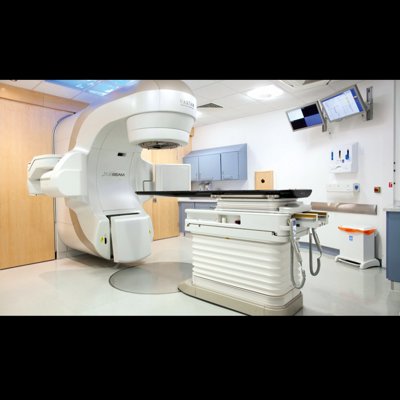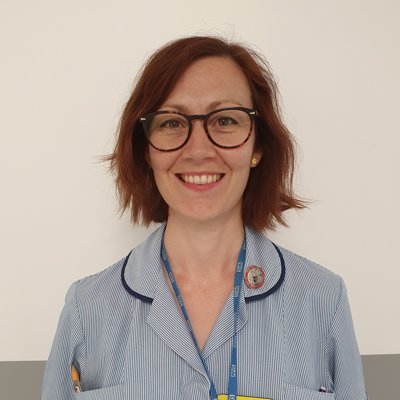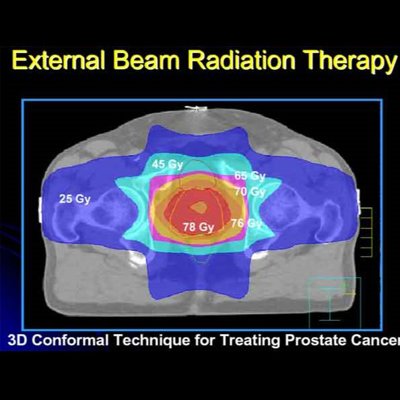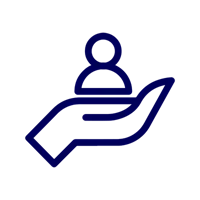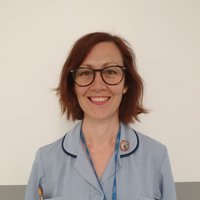
Nicky Barry
Therapeutic Radiographer at NHS
I work with patients who have a cancer diagnosis and require radiotherapy as part of their treatment.
About Nicky...
Who am I?
"Most of the personality types mentioned working with people, as well as having compassion, understanding and being a good listener. Having good people skills is really essential for my job, as we work with lots of people who are unwell or may be struggling with emotional issues. We have to be willing to help people and working as part of a team for the benefit of our patients is really important and gives us our drive and motivation.As well as this, we work with very complex equipment and need to have a good understanding of the scientific principles behind what we do, and we need to be able to simplify a lot of things so our patients can understand how we work. This communication and ability to explain things to suit the needs of the patient is really important.We are also often under a lot of pressure with a big workload, with lots of things to deal with in any given day. We therefore need to be efficient, organised and calm under pressure to keep up with the demands of the service.We also need to be technically minded and able to problem solve. "
What do I do?
"I work with patients who have a cancer diagnosis and require radiotherapy as part of their treatment. This involves informing them about the treatment itself and side effects, knowledge of the equipment used to do the job, skills in imaging to verify the area that treatment is being delivered, and an overall understanding of the biological principles behind the treatment.Lots of people get radiotherapy mixed up with diagnostic imaging. There are two types of radiographer; diagnostic radiographers will use x-rays to diagnose issues with patients like broken bones, or CT scans to investigate health issues. Therapy radiographers use x-rays to treat patients with cancer, as the x-rays can be used to eradicate tumours, or treat an area where a tumour has been removed to reduce the risk of the cancer returning in future, and it can also be used to help with pain relief and symptoms of cancer.We work within teams of radiographers to carry out radiotherapy treatments that a doctor has prescribed, and which physicists will have created and planned. We have to ensure that all the relevant information is present before delivering any radiation dose to the patient, and keep a record of the patients' treatment throughout their radiotherapy course. Some patients need lots of extra support from other healthcare professionals to manage the side effects of treatment, such as dieticians, speech therapists and psychologists, as well as doctors who may need to review patients from time to time. Some therapy radiographers can specialise in reviews too, meaning they can assess the patients and prescribe medication if necessary.I mostly enjoy the number of people I see every day, from the team I work with on my machine, to the wider team who are available to support the patient, and of course meeting so many patients. As most patients are prescribed a course of treatment over several days/weeks, we can really get to know them throughout which makes the process very rewarding as we can see them through a challenging time of their lives.Radiographers who are newly qualified start of NHS pay band 5, with good prospects to move up to band 6 within a few years. Progression within the role would involve leading a team of radiographers, becoming a manager or choosing to specialise in a specific role within radiotherapy."
How did I get here?
"I had a very mixed path to get to my final role in the NHS. One of my first jobs when I left school was working in a blood testing laboratory, which gave me a taste of NHS work. It gave me plenty of skills but after a few years of fitting this job around my studies, I wanted something more challenging.I left school with A levels in Maths, Physics and Biology, but I found them really tough and decided to change paths at university. I took a year out to think about my direction which was when I worked in the laboratory, then chose to study popular music and media at uni. I had a great time and had lots of fun part time jobs in bars and theatres while I was there, but when I graduated, the job prospects were limited and I struggled to find work.I drew on my previous skills as a lab assistant to apply for jobs in similar roles but in order to progress, I'd have to retrain. I had to really have a think about what direction I wanted to go in as I wasn't happy working in the job I'd landed at the students union after graduating-this kept me going but wasn't where I wanted to be.I did some research and radiography caught my interest, however I had never heard of radiotherapy. I spoke to a course leader who gave me lots of information and encouraged me to visit a radiotherapy centre locally before applying. I spent a day watching the radiographers do their jobs and found it all really interesting so decided it was something I wanted to try. I started studying a few months later in Bristol and haven't looked back since! At uni, students have a mixture of taught lectures in the classroom and placements in a department where you really get to grips with the job itself. It's good practice for the real thing and your lessons in class give you the theory you need. Placement was tough, but essential to your learning and mean you can go to work afterwards with a good idea of how things work."
The life I live
"I am a musician!I always loved playing music as a young person and now I play percussion in several bands in my home town. I find it helps me to balance my professional life with my personal life, it's good to have interests outside of work to help you switch off from the stresses of work, and makes the hard work worth it when you have rehearsals, gigs and festivals to look forward to!This job brought me to a city with plenty of music and culture for me to discover, so studying and working here was what helped me to rekindle my love of music and performance. I also find the job allows me to keep an active social life, as I don't have to routinely work nights or weekends."
My typical day
"If we are on the early team, our first job is to \"run up\" the treatment machines to make sure they are safe and ready for treating patients. This happens before any patients arrive to the department, and we do some quality assurance checks to warm up the machine and check everything is working as it should. Engineers and physicists are always on hand to help if there are problems, but this time of the day requires a good knowledge of how the machine works-it's very complex and sensitive!Our first patients usually start around 8am. We treat patients with many different cancer diagnoses, which means radiation can be delivered to all parts of the body. Our job is to set up a patient on the treatment couch, making sure they are in the correct position, and take an x-ray image to scan the area and confirm the volume needing treatment is in the right place. Patients are given small tattoos on their skin which are used to align them correctly each day, and patients who are having treatment to their head or neck will have a mask made to keep them completely still during treatment. We need to understand how all of these treatments work as we will come across several different types of treatment every day!On a busy day, a machine might be booked back to back from 8am to 6pm, with individual treatment times varying depending on what we are doing. The quickest may just take ten minutes, longer treatments can take an hour or more. We usually have a late team to cover the end of the day and we share the day in two halves to give ourselves time to do other things as well as treatments, it can be quite tiring! Each time a patient is ready for treatment delivery, we have to leave the room so we aren't exposed to any radiation. This means the role is very active, we are never sitting down for long as we are in and out of the treatment room all day. Other jobs can involve talking to patients, especially new patients who may have questions or be nervous to start. There are usually a few things to chase up throughout the day; prescriptions for patients, emailing doctors or reviewers about patient issues, and admin tasks to make sure everything is recorded correctly and checked properly. At the end of the day the machines are switched off; radiotherapy is an outpatient service, which means that appointments are booked during normal working hours in the day. Unlike diagnostic radiographers, who have to be on call to scan patients at any time of the day, radiotherapy never takes place overnight as it's not necessary. There are some occasions where patients are treated as an \"emergency\" but this usually means they need to have some radiation within 24hours of referral. This can happen over a weekend, in which case more experienced radiographers would be on call to deal with it during the day. Sometimes we run clinics on Saturdays, but usually I work Monday to Friday, with a mixture of early and late shifts."
My qualifications
"A Levels: Maths, Biology, PhysicsAS Level: ChemistryGap year: worked as a medical laboratory assistant in an NHS hospitalBA Degree: Media, Communications and Popular Music (University of Liverpool)Worked in Liverpool/travelled for two years after graduationMSc Degree: Radiotherapy and Oncology (UWE)This led to my current role as a therapeutic radiographer."
Nicky's Photos
